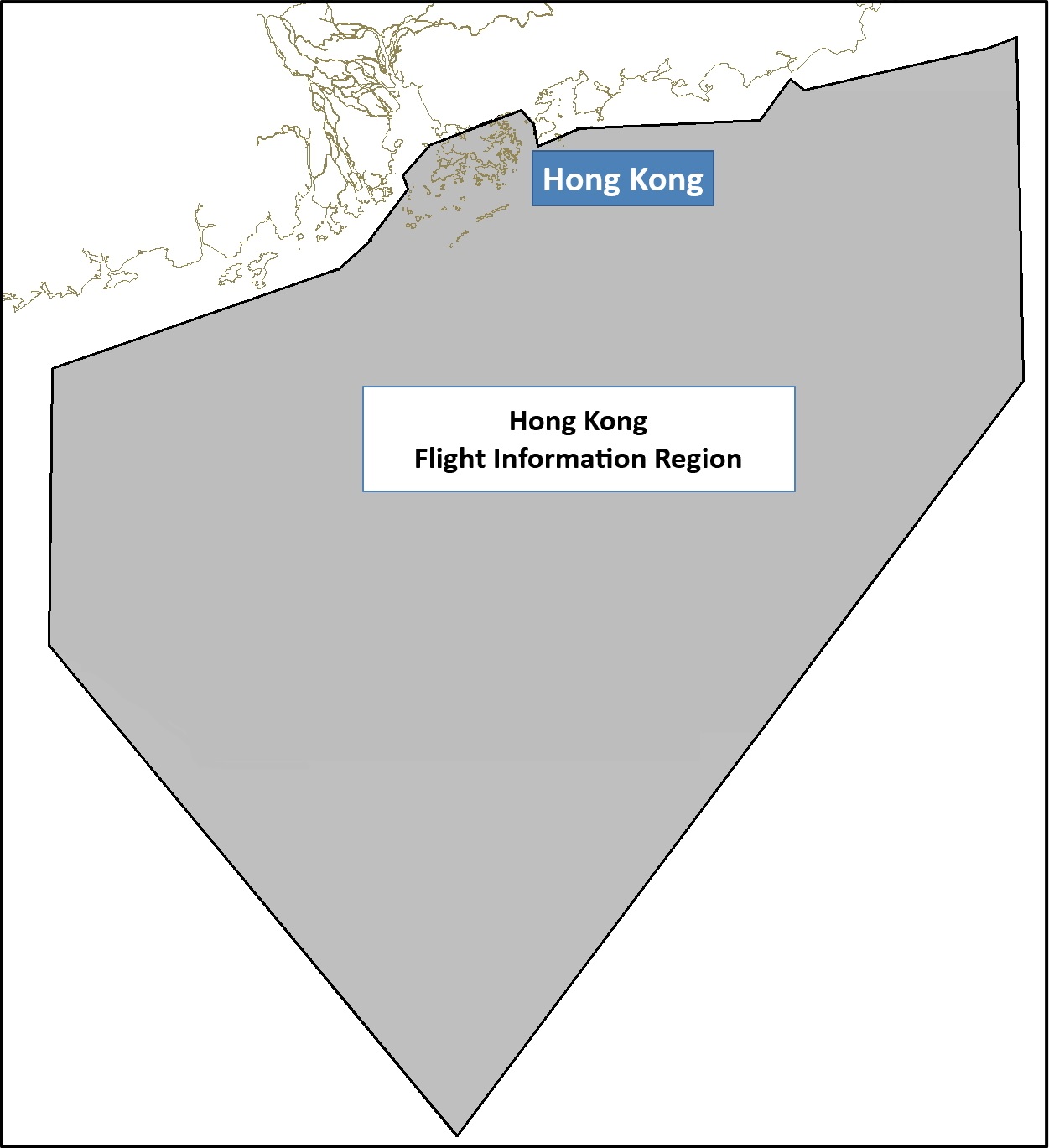Airspace
The Air Traffic Management Division of Hong Kong Civil Aviation Department (CAD) is responsible for the provision of air traffic control service, flight information service and alerting service within the Hong Kong Flight Information Region (FIR) as designated by the International Civil Aviation Organization (ICAO). The airspace covers a total area of 276,000 square kilometres extending over the South China Sea.

The Hong Kong Flight Information Region
(area in grey)
Within the Pearl River Delta (PRD) region, there are five major airports (namely, Hong Kong International Airport (HKIA), Guangzhou Baiyun Airport, Macau International Airport, Shenzhen Bao'an Airport and Zhuhai Airport) and all have experienced
phenomenal growth in air traffic volume. In order to ensure flight safety in the PRD airspace while supporting air traffic growth, the Civil Aviation Administration of China (CAAC), the CAD of Hong Kong SAR and the Civil Aviation Authority
of Macao SAR (CAAM) jointly established a Tripartite Working Group (TWG) in 2004 to formulate measures to harmonise airspace and air traffic management (ATM) arrangements in the PRD region. The TWG drew up the "Pearl River Delta Region
Air Traffic Management Planning and Implementation Plan (Version 2.0)" (the Plan) in 2007, based on the principles of joint airspace planning, use of common standards, and harmonised flight procedure design. Under the Plan, the whole
PRD airspace planning is considered in a holistic manner, various measures are formulated to enhance overall airspace and air traffic management efficiency. The overarching objective of the Plan is to optimise the utilisation and management
of PRD airspace, in a safe and efficient manner, for the mutual benefits of the five major airports in the PRD region. The TWG strictly adheres to the safety regulations on airspace management set out by the ICAO, and makes a concerted
effort on the design of PRD airspace with an aim of ensuring that the use of airspace is optimised and flight procedures of the major airports in the region are compatible with each other.
The Plan has already taken into account
future air traffic demand of the PRD region, as well as analysis of the ATC operational environment and development. It also recommends a range of measures to improve ATM and planning of the PRD region to optimise the developmental
opportunity and synergy of the five major PRD airports. By analysing the historic and projected growth of air traffic in the region, development plan of individual airports as well as the airspace structure of individual FIRs, the
plan proposes measures in relation to enhancement of airspace planning, operation standards and procedures to achieve a more efficient ATM operational environment for dealing with the growing air traffic demand of the PRD in the long
run.
In order to balance the need to keep the public, including the aviation sector, posted of key progress made by the TWG, the three governments have announced, from time to time initiatives that have been successful implemented.
Measures that were announced include the following:
(a) establishment of two additional handover points and corresponding air routes between Hong Kong and Guangzhou FIRs to cater for flights overflying Hong Kong and landing
in Guangzhou and Shenzhen;
(b) establishment of new air routes and another additional handover point between Hong Kong and Guangzhou FIRs for flights operating between Hong Kong, Macao and the eastern part of the Mainland;
and
(c) adjustment of the Zhuhai airspace structure and establishment of peripheral flight paths in the PRD region.
Implementation of the Plan is an on-going task. The three civil aviation authorities have been maintaining
close liaison through the TWG platform. Taking into account the prevailing situation, the three sides will continue to deliberate on the work plans so as to enhance airspace efficiency collaboratively. In this regard, the CAD will
continue to contribute proactively to the discussions of the TWG in order to take forward the enhancement measures in the Plan in a pragmatic and progressive manner.
Relevant press releases:
- Pearl River Delta Region Air Traffic Management Planning and Implementation Tripartite Working Group high-level meeting held in Hangzhou (4 July 2019)
- Pearl River Delta Region Air Traffic Management Planning and Implementation Tripartite Working Group high-level meeting (12 September 2018)
- Pearl River Delta Region Air Traffic Management Planning and Implementation Tripartite Working Group meeting held in Chengdu (22 November 2017)
- Civil aviation authorities of Mainland, Hong Kong and Macau sign Memorandum of Co-operation on enhancement of air traffic management efficiency (with photo) (13 July 2017)
- Meeting held between CAD and Air Traffic Management Bureau of CAAC (19 May 2017)
- PRD Region Air Traffic Management Planning and Implementation Tripartite Working Group meeting (9 December 2016)
- DGCA pays courtesy call on Civil Aviation Administration of China (8 July 2016)
- CAAC, CAD and AACM sign agreement on liaison mechanism to enhance co-operation and exchange (9 May 2016)
- Meeting held between THB, CAD and Director General of Air Traffic Management Bureau of CAAC (23 March 2016)
- Civil Aviation Department's statement (7 March 2016)
- CAD and ATMB exchange views on optimisation and co-operation on use of PRD airspace (25 November 2015)
- CAD and CAAC reach agreement on new air routes for traffic to and from eastern part of the Mainland (20 October 2015)
- CAD's statement to media reports on PRD airspace (10 March 2015)
- Pearl River Delta Region Air Traffic Management Planning and Implementation Supervisory Group Meeting (18 June 2012)
- Pearl River Delta Region Air Traffic Management Planning and Implementation Supervisory Group meeting (1 September 2011)

